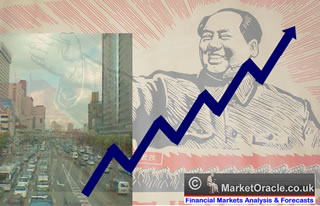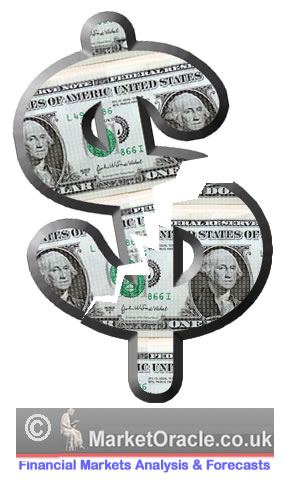Why China Will Not Revalue their Currency
Currencies / China Currency Yuan Nov 26, 2009 - 10:15 AM GMTBy: Larry_Edelson
 President Obama’s recent trip to Beijing has sparked a lot of talk about China revaluing its currency, the yuan (officially called the renminbi), higher.
President Obama’s recent trip to Beijing has sparked a lot of talk about China revaluing its currency, the yuan (officially called the renminbi), higher.
Don’t you believe it. Not for a minute. The fact of the matter is China is not going to do anything substantial to increase the value of its currency, except perhaps take a baby step here and there to appease politicians around the world.
Why? It’s simple …
A. Because Beijing doesn’t have to. As our biggest creditor, China’s in the cat-bird seat and they’re calling the shots. President Obama isn’t, and neither is Congress. Nor is any other governing body in the world in a position to get Beijing to bend.
And Beijing neither wants nor needs a stronger currency. Period. Why? Because …
B. China is still too dependent upon exports. And it will be for quite some time. I figure it will take China about 10 more years to boost its internal consumption enough to sustain the country’s growth with far less dependence upon exports.
 |
| China’s dependence on exports is a major reason it won’t allow the yuan to appreciate in value. |
Just based on that, Beijing is not likely to allow the yuan to appreciate.
Some will disagree with me, arguing that if China’s currency is stronger, Chinese consumers will buy more foreign goods.
That’s partly true. But that argument applies only to the very rich in China, who are a miniscule fraction of the population. For most of the 1.3 billion Chinese, a stronger yuan wouldn’t change their consumption habits one iota.
C. China is still the factory to the world, and a cash cow. Its trade surplus in the first 10 months of this year stood at $159 billion. In October alone it grew $23.99 billion, the biggest gain this year.
And its central bank reserves also continue to grow by leaps and bounds, now standing at more than $2.3 TRILLION.
Also important …
D. China has not yet secured enough oil, coal, gold, food, steel, copper, rubber, wheat, soybeans — you name it — to …
1. Fill its coffers with enough supplies to meet the rapidly growing demands and basic needs of its 1.3 billion people, and …
2. Hedge against the long-term decline in the value of the U.S. dollar.
That’s important to understand because hedging against the disappearing dollar is a major concern in Beijing. After all, most of the $2.3 trillion in its piggy bank is invested in dollars.
 |
| China is protecting its money by investing in natural resources. |
So, as the dollar continues to slide in value, Beijing needs to protect its money. The best way to do that? Invest in contra-dollar assets, namely natural resources, which gain in value as the dollar falls.
It’s another reason why Beijing would never do anything drastic to revalue the yuan higher. Think about it. Beijing has as much as $2.3 trillion stashed away. If it were to suddenly revalue its yuan higher by say 20% against the dollar, its existing dollar reserves would instantly be worth 20% less.
In other words, China would take a hit of as much as $460 billion in the purchasing power of its reserves. Why the heck would they do that?
True, it means their yuan would then buy more dollars. But Beijing doesn’t want a lot more dollars. It wants natural resources, for the aforementioned reasons.
Plus, if Beijing were to suddenly revalue the yuan 20% higher, the price of natural resources that it’s still in the market for would skyrocket in dollar terms, and in the end, cost Beijing more to buy than they are paying in the markets now.
You certainly don’t need to be a rocket scientist or have a Ph.D. in economics to figure this out. So why so many analysts and politicians are forecasting a dramatic appreciation in the yuan is beyond me. I guess they just don’t understand the basic dynamics at work, including the fact that …
Even if Beijing did take steps to increase the value of the yuan, how is that good for the dollar?
Just think it through: To keep the yuan linked to the dollar, as the dollar falls, Beijing must sell yuan to press its currency lower, and buy dollars.
So if Beijing were to stop selling yuan and start restricting the supply of yuan instead to cause their value to rise, Beijing would also have to start selling dollars to buy yuan.
And what would happen to the dollar then? It would plummet sharply!
So I fail to see how any appreciation in the value of the yuan would be good for the U.S. dollar. Which leads me to my next point …
Looked at properly, the dollar-yuan debate is NOT really one of the yuan being undervalued.
Rather, it’s about the U.S. dollar being OVERVALUED.
That’s another way of saying the same thing. But it puts the emphasis on the correct side of the equation. It’s not the yuan that’s undervalued. It’s the dollar that is overvalued against the yuan. It’s the dollar that must fall much more in value.
This is hard for some to understand. But this is the view point I’ve had on this subject for the last nine years. And lo and behold, it’s what’s been happening. The yuan has not increased in value much at all, and Beijing has resisted almost all voices claiming it must increase the value of its currency. Instead, it’s been the U.S. dollar that’s been sliding!
 |
| I believe the U.S. dollar will continue to slide lower for at least two more years. |
I believe that trend will continue, for at least two more years. China will not take any measurable steps to directly cause the yuan to appreciate. Instead, the dollar’s value will continue to fall in the Forex markets, almost non-stop.
Now don’t get me wrong. I’m not unpatriotic. Although I spend most of my time in Asia now, my first love is the U.S. of A. It’s the greatest country on the planet, despite all of its problems. And, it WILL recover eventually from the crisis it finds itself in.
I’m just practical and exercising uncommon thinking, which has helped my subscribers make more money in these markets than they thought possible.
It’s also why I cannot overemphasize how important it is that you, too, exercise uncommon thinking these days, because the world as you know it, is changing dramatically.
What you see happening in the markets and even in politics is not always what it seems to be. What appears to be logical and true is very often the exact opposite — illogical and false.
But right now, gold is sending very clear messages. Its new leg up to much higher prices is well underway. And although there will be pullbacks along the way, I have absolutely no doubt gold will at least DOUBLE, if not TRIPLE, in the years ahead.
So I’ll leave you today — and for the upcoming holiday — with another uncommon thought: If you think, like so many other mainstream analysts seem to think, that central bankers are not happy that gold is soaring, think again.
The central banks of the world, especially our Federal Reserve and its Chairman, Ben Bernanke — are OVERJOYED gold is thrusting higher. Why? Because it means the word is re-inflating, rather than deflating.
Best wishes and have a Happy Thanksgiving later this week,
Larry
This investment news is brought to you by Uncommon Wisdom. Uncommon Wisdom is a free daily investment newsletter from Weiss Research analysts offering the latest investing news and financial insights for the stock market, precious metals, natural resources, Asian and South American markets. From time to time, the authors of Uncommon Wisdom also cover other topics they feel can contribute to making you healthy, wealthy and wise. To view archives or subscribe, visit http://www.uncommonwisdomdaily.com.
© 2005-2022 http://www.MarketOracle.co.uk - The Market Oracle is a FREE Daily Financial Markets Analysis & Forecasting online publication.



